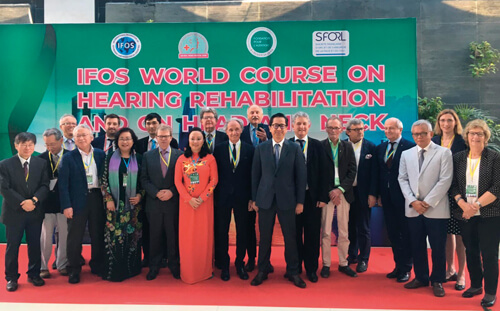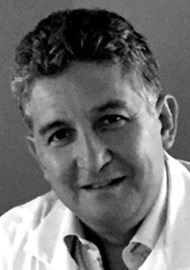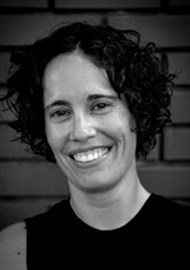Drs Mom and Lea have thrown down the gauntlet, challenging us all to openly assess the global impact we have as countries, societies, surgeons and individuals. Being a surgeon is not all about surgery. How we respond will define our generation.
If ever there was an example of how globalisation affects healthcare, the current, unexpected and exceptional COVID-19 pandemic has shown the world how highly interconnected we are as a profession and as a species. The virus spread with mind-boggling prescience, demonstrative of the thematic concepts behind the IFOS World Congress in Vancouver.

Organisers and speakers at the 4th World IFOS Course on Hearing Rehabilitation
and on Head and Neck, in Ho Chi Minh, Vietnam, November 2019.
What once was a given, in many cases is no more. One RNA virus completely changed the nature of human-to-human interaction, laying bare the fragility of our interconnectivity. As industries closed their doors to limit the spread of the virus within our communities, unemployment rates soared to levels previously unseen in our societies. Economies suffered severely. No country has been immune to its devastating effects, even if not directly impacted by significant prevalence or hospitalisation or death rates. Admittedly, the same globalisation that allowed the virus to spread over borders and across oceans also allowed the sharing of knowledge between colleagues in efforts to limit the potential disaster.
“What once was a given, in many cases is no more. One RNA virus completely changed the nature of human-to-human interaction, laying bare the fragility of our interconnectivity”
And yet, if you looked for them, there were unexpected consequences that are worthy of pause. News stories described how people in some cities witnessed clear sky for the first time in years, as vehicular traffic and industrial emissions dropped; the lagoon of Venice became translucent; wild animals were seen moving freely in cities, and marine mammals were seen approaching close-to-abandoned coasts. We saw again the beauty of the world around us.
The pandemic has exposed to us all, the consequences of our activities on humanity and on the planet. The question that remains is, what are we going to do with this newfound knowledge? It is an opportunity to question what role our activities had in initiating, perpetuating and ultimately halting the spread of the virus; why were some countries better prepared; what role did global supply chains have, or not; what were the strengths that helped us, and the pitfalls that could have been avoided? However, the diseases humanity has had to, and still has to face are not limited to COVID-19. The global burden of disease, inside and outside of our chosen specialty, remains great and remains highly dependent on the availability of appropriate resources; the pandemic did nothing if not lay this bare before us.
The IFOS World Congress of Otorhinolaryngology in Vancouver, is an opportunity for a call to action: as a profession, it behooves us to seize this opportunity to underscore the global impact of our specialty. The IFOS World Congress, for instance, was always going to be ‘green’. But is that now enough?
“We saw again the beauty of the world around us”
Is it enough that we cover the numerous fields of our specialty, learning from colleagues from all around the world? Is it enough that we learn of scientific advances in our specialty? Is it enough that a special place be offered to report ENT global actions being undertaken in the world currently, including a special presentation by the WHO on their action and projects in otolaryngology, and a session be offered by the newly born Global Initiative in Otolaryngology Head Neck Surgery, initiated by our American colleagues? Or special sessions on zero waste in the operating room highlighting the global impact of our daily activities? Or important themes such as telehealth and virtual access to care which made it possible to keep us connected despite the pandemic? How much is enough for each of us to do?
What will be your challenge in the face of globalisation in healthcare at the World Congress in Vancouver?





